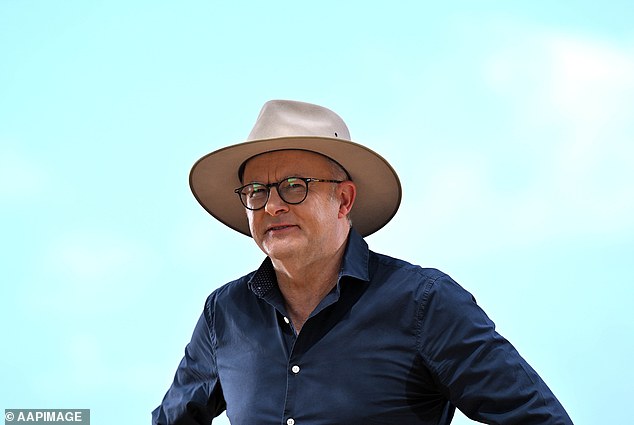Anthony Albanese comes under fire for shock comment after Aussies voted No to the Voice – as PM is forced to clear the air
Anthony Albanese sparked outrage when he said he still supported Makarrata despite Australians overwhelmingly rejecting the Voice referendum.
The Prime Minister made the statement on Saturday during the Garma Festival, at a ceremonial location in the north-east of Arnhem Land, in the Northern Territory.
“We remain committed to Makarrata, that powerful Yolngu word given to the nation, for reunification after struggle,” Mr Albanese told the crowd.
The comment sparked outrage, with many Australians pointing to the failed Voice to Parliament referendum in October 2023, in which 60 percent of Australians voted no.
Mr Albanese made it clear on Sunday that his government is not pursuing a Makarrata Commission – one of the key pillars of the Uluru Statement from the Heart and seen as a pathway to a treaty – and instead only supports the Makarratta concept.
“We voted NO, why is this so hard for you to understand?” wrote one outraged Australian on social media platform X.
‘NO means NO! We do not agree to reparations and treaties, we do not agree to racial division, we do not agree to separatism. We are ALL Australians,’ a second noted.
‘I don’t remember there being a maybe option in the referendum. I’m pretty sure it was yes and no and we voted no. Strange to go so hard against a majority of the population,’ a third person chimed in.
Mr Albanese arrived at the Garma Festival ceremonial site in north-eastern Arnhem Land on Friday and was escorted through the grounds by members of the Dhalwangu Clan (pictured).
A fourth added: ‘You’ve wasted half a billion on attempts at virtue signalling – you’re a big part of the problem.’
On Friday, Mr Albanese arrived at the Garma Festival and was escorted around the grounds by members of the Dhalwangu clan.
The festival is the largest gathering of indigenous people in Australia and is used to celebrate the life and culture of the Yolngu people.
The Prime Minister joined recently sworn-in Minister for Indigenous Australians, Malarndirri McCarthy, at the Gulkula site.
In a speech on Saturday, Mr Albanese said his government’s commitment to a “better future for First Nations peoples” is “stronger than ever”.
“We remain committed to Makarrata, that powerful Yolngu word that was given to the nation. It simply means this: coming together after a struggle,” Mr Albanese told the crowd.
‘I am sometimes asked by journalists about Makarrata and I mention the definition. And I say, nobody is against the fact that there was a struggle.
‘And no one can be against the principle that after a struggle, people should come together. That’s all it means’
“We will continue to work in good faith with leaders and communities to determine what steps need to be taken at the national level,” Mr Albanese added.
Mr Albanese explained that his government is determined to “address the legacy of dispossession and face the reality of backwardness”.
“My colleagues and I have come to Garma to renew our commitment to a better future for First Nations people,” said Mr. Albanese.
“We will leave here more determined than ever to make it happen. Let us continue to work together for that better future.”
However, Mr Albanese later said his government would not pursue a Makarrata Commission, one of the three pillars of the Uluru Statement from the Heart.
“That is not what we proposed,” Albanese told the ABC’s Insiders program at the Garma Festival on Sunday.
‘What we have proposed is that Makarrata is simply the idea of coming together.
‘Ongoing engagement is what we do with coming together. Now, that can take forms as it evolves… I’m not getting ahead of myself.
“It means listening to First Nations people, respecting them and then responding to them.
‘We know that so far we are missing more than half, or unfortunately more than two-thirds, of the Closing the Gap targets.
‘So we can’t just do everything the same way. And part of that of course includes and has to include listening to people who are directly affected by it.’
He said the process of monitoring the treaty and finding the truth would take different “forms” in the future.

Mr Albanese said his government would not pursue a Makarrata Commission
He added that the states and territories were pursuing separate treaties, both before and after the referendum, and that the government was not planning a truth and justice commission.
“That happens in different stages and that is right, as there are different points of view and there is not one homogeneous group in the country,” he said.
‘We were not implementing a national treaty for the referendum. What happened was that states and territories acted on it.
‘Regarding Makarrata, a Yolngu word that simply means ‘coming together after a struggle’, I wonder why people find it so complex.
“It’s clear that there’s been a struggle for First Nations people. That’s why we talk about Closing the Gap, or what in some areas is really a gap.
“And coming together is a principle of walking together, that involvement. It is not a moment in time. It is a process of coming together after a struggle.”
